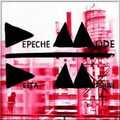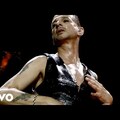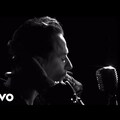
After the drugs, the drink, the near-deaths, these electro legends tell Ed Potton why anonymity has kept them going
Since forming in Basildon, Essex, in 1980, Depeche Mode have become huge. They have sold more albums (100 million) in the past 30 years than any other British band and had more than 50 UK and US hits, their brand of shadow-strewn synth-pop making them the biggest electronic act in history, influencing everyone from the pioneers of techno to the Pet Shop Boys. They carried on when Vince Clarke, their original leader, jumped ship in 1981 to form Yazoo and then Erasure. Martin Gore, their main songwriter, recovered from alcoholism. Dave “the Cat" Gahan, their singer, has survived several brushes with death.
But there is another, more recent achievement that eclipses all of the above: they were called weird by Simon Cowell. If the baron of bland thinks that, you must be doing something right.
“That was great," Gore giggles during a break from filming their new video, Soothe My Soul, in the Meatpacking District of Manhattan. Gore, 51, had joked in an interview that “somebody should shoot" Cowell, who tweeted back: “A ton of people have got shot this year, and people like weirdo Gore encourage this." Gore was surprised that “a little flippant comment" got such a response — although, he adds with a grin, “I think the majority of the world agreed with me".
The spat with Cowell illustrates the gulf that exists between Depeche Mode and the British musical establishment. They’ve won a solitary Brit, Best Single in 1991 for the brilliant alternative love song Enjoy the Silence, but the surviving trio have never won a Lifetime Achievement award.
Gahan, 50, a proper rock star in leather and Brylcreem, is sanguine, pointing out that Led Zeppelin never got a Grammy. But keyboardist Andy Fletcher, 51, the only one still resident in the UK (Gahan lives in New York, Gore in Santa Barbara, California), feels it more keenly: “It annoys us, when you see some of the bands who have won it." Past recipients of the Lifetime Achievement Brit include Status Quo and the Spice Girls.
Depeche Mode occupy an unusual position, that of a hugely popular niche band, variously claimed by the gay, industrial, Goth and even S&M scenes. “I think people do see us as their little secret," Gore says. “Even though it’s not that much of a secret — if you go into Europe about every third person has got one of our records somewhere."
They refer to their famously ardent fans as “the black swarm". But outside this clandestine global community the band can often pass unnoticed. “A lot of people know the name Depeche Mode but can’t point to the individuals in the band," Fletcher says. “We get the best of both worlds."
That’s bizarre in a way, because the individuals couldn’t be more, well, individual. Gore is wary, contained, slightly mischievous; Gahan open and geezerish, welcoming questions about his dark years (“Knock yourself out!") and sounding genuinely pleased when I say that their latest single, the stately, powerful Heaven, is one of the best things they’ve done. Fletcher is the least starry, a Chelsea season ticket-holder in Alan Bennett glasses with the air of an affable company director. In a way that’s what he is: the business head who glues everything together.
The trio’s new album, The Delta Machine, continues a fascination with the blues that first crystallised when they added a swampy riff to Personal Jesus in 1989. The Delta Machine is a long way from Muddy Waters: plangent synths, austere beats and Gahan’s cavernous baritone still dominate. “But our influences have always come from there," Gahan says. “Singing our woes and moaning about our lives. That’s what the blues is, really."
Gore is regarded as such a prophet of misery that in 2009 he was subpoenaed as an expert in melancholy by an American gamer who was suing the makers of the World of Warcraft video game for alienating him from society. Gore took it as a compliment, although he didn’t appear. “The other expert was Winona Ryder! Ha ha."
Sober for seven years, he insists that he is now in “a very happy place in my life. I’m looking forward to the future." That might be where all the mentions in the album of heaven, golden gates and farewells come from: “When you look forward to the future I suppose you can’t help but think about ... death."
Gahan says that Gore is “a joy to work with" now “and it’s not always been like that". Making the Playing the Angel album in 2005, “Martin was drunk most of the time. He’d come in in the morning, the producer would strap a guitar round him, get as much out of him as possible, then he’d pass out."
Of course, Gahan has had his own “difficult" moments. Broken, one of three songs on the album that Gahan wrote, is ostensibly about a troubled friend but “really I’m ... recognising myself in him." Which aspects? “Very destructive ... got it all laid out for you but you find some way to just f***ing destroy it." He laughs warmly.
The peak of their success in the late Eighties and early Nineties was a time of “giant cheques coming in, not really knowing what to do with it, throwing massive parties". He watches footage of himself on the infamous Devotional tour of 1993 and realises that “the wheels had fallen off. But when I went off the road, that’s when shit really got crazy." He would buy heroin and check into a hotel. “Four weeks later — where we going? South Africa, Chile — get on a plane. Tell my manager: ‘We need to get a lot of methadone cos I’ve got a real habit.’ "
The Nineties brought three scares in succession: in 1993 he had a heart attack on stage; in 1995 he slit his wrists; in 1996, finding that he “couldn’t get a buzz from anything anymore", he injected a speedball, the mixture of cocaine and heroin that killed John Belushi and River Phoenix. His heart stopped for two minutes. “I don’t live like that today," he says softly.
But what Gahan says was the most frightening scare of all came in 2009, when he had been clean for more than a decade: a cancerous tumour was found in his bladder. “I kinda felt like, ‘what? You f***ing kidding me? Now?’ "
The tumour was successfully removed and he remembers recovering with his (third) wife and children: “I really couldn’t give a shit about anything else." He adds, with a laugh: “That lasted a couple of weeks, then I really wanted to get back on the road." He ended up having chemotherapy wherever he was on tour, “which wasn’t ideal in retrospect".
Such resilience has paid off. They still get consistently good reviews, their 2009 album, Sounds of the Universe, topped charts in 14 countries and on their forthcoming world tour they will play to an estimated 1.5 million people.
The Gore-Gahan axis is healthier than it’s been for years. There were times when they “said barely anything to each other for months", Gahan admits. “I had a lot of resentment towards Martin that was not deserved. I wanted more acknowledgement for what I do for him."
But although they are “completely different", Gahan thinks it’s “no coincidence that we were brought together". They have something profound in common: both discovered that the man he called Dad was not his biological father: Gahan’s left home when he was a baby while Gore’s was an African-American GI. Has that been a source of solidarity? “Unspoken, but yeah, I think so," Gahan says.
What really helped their relationship was Gahan’s establishment as a songwriter in his own right, on two solo records and an album with the production team Soulsavers. That “was the antidote really — get off the whining pot".
Gore has enjoyed a liberating side project of his own, collaborating with his former bandmate Vince Clarke on an album of techno under the name VCMG. It was all done by e-mail. “Even though we were in the band together for 18 months, Vince and I were never really close friends and it was so long ago that it was almost like working with a stranger."
Making techno has given Gore further insight into the EDM (electronic dance music) explosion in America. In the Eighties “we were carrying the flag [for electronic music] single-handedly, but it’s huge everywhere now. But I do find it quite weird to go to a huge venue and see a DJ on stage. It’s a totally different thing. Making an album and writing songs is an artform and we take it seriously."
That’s one of the things that has kept them together, although their common roots in Basildon have also helped, Fletcher says: “We came from the same town, had the same working-class beliefs, same humour, same taste in music." It brings to mind a less flippant comment that Gore made than his “shoot Cowell" line, about the dominance of manufactured acts. “What happened to bands getting together?" he asked. They certainly don’t make ’em like Depeche Mode any more.
The Delta Machine is out on Monday. Depeche Mode play the O2 Arena, London, on May 28.




